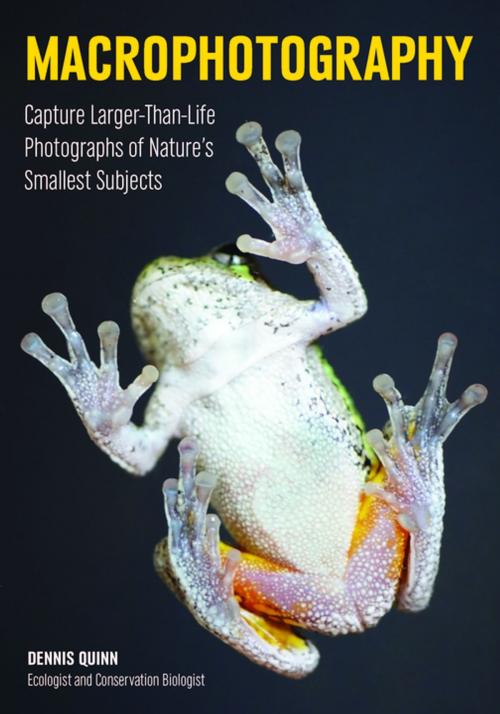Macrophotography
Create Larger-Than-Life Photographs of Nature's Smallest Subjects
Nonfiction, Art & Architecture, Photography, Equipment & Techniques, Techniques| Author: | Dennis Quinn | ISBN: | 9781682030776 |
| Publisher: | Amherst Media | Publication: | August 22, 2016 |
| Imprint: | Amherst Media | Language: | English |
| Author: | Dennis Quinn |
| ISBN: | 9781682030776 |
| Publisher: | Amherst Media |
| Publication: | August 22, 2016 |
| Imprint: | Amherst Media |
| Language: | English |
Macrophotography allows for the capture of small photographic subjects in life size or larger magnification, allowing viewers to experience the world around them in a way that is simple not possible with the naked eye. With a magnified view, we can see the distinctive make-up of an insect, animal, or flower-its texture, details, and subject features that we might otherwise be completely unaware of.
In this unique book, Dennis Quin turns his macro lenses upon the natural world and teaches readers to choose and use the tools they need to capture magical images of all manner of bugs, flowers, reptiles, and more. In each of the 60 sections in this beautifully illustrated book, Quin details the tricks of the trade. You’ll learn where to find your subjects, how to make sure that the background adds to the overall impact of the image, how to track insects in flight, and other skills that will increase your odds of capturing technically strong, visually rewarding shots. In each section, you’ll see 1 to 3 images of a unique subject and will get detailed instruction as to how Quin shot the image-including the equipment used, settings chosen, the camera angle, and more.
There’s more to this book than instructional photographic text. In each of the 60 discrete sections, Quin provides fascinating tidbits about each animate object-describing the life cycle, feeding habits, mating rituals, breeding, and much more-or characteristics of botanical subjects.
This book provides an inspiring and enlightening blend of photographic technique and fascinating science lessons. It is perfect for serious amateur photographers, wildlife/landscape photography enthusiasts, and even those whose bread and butter” shots are in another genre completely. The book is sure to impress.
In this unique book, Dennis Quin turns his macro lenses upon the natural world and teaches readers to choose and use the tools they need to capture magical images of all manner of bugs, flowers, reptiles, and more. In each of the 60 sections in this beautifully illustrated book, Quin details the tricks of the trade. You’ll learn where to find your subjects, how to make sure that the background adds to the overall impact of the image, how to track insects in flight, and other skills that will increase your odds of capturing technically strong, visually rewarding shots. In each section, you’ll see 1 to 3 images of a unique subject and will get detailed instruction as to how Quin shot the image-including the equipment used, settings chosen, the camera angle, and more.
There’s more to this book than instructional photographic text. In each of the 60 discrete sections, Quin provides fascinating tidbits about each animate object-describing the life cycle, feeding habits, mating rituals, breeding, and much more-or characteristics of botanical subjects.
This book provides an inspiring and enlightening blend of photographic technique and fascinating science lessons. It is perfect for serious amateur photographers, wildlife/landscape photography enthusiasts, and even those whose bread and butter” shots are in another genre completely. The book is sure to impress.
Macrophotography allows for the capture of small photographic subjects in life size or larger magnification, allowing viewers to experience the world around them in a way that is simple not possible with the naked eye. With a magnified view, we can see the distinctive make-up of an insect, animal, or flower-its texture, details, and subject features that we might otherwise be completely unaware of.
In this unique book, Dennis Quin turns his macro lenses upon the natural world and teaches readers to choose and use the tools they need to capture magical images of all manner of bugs, flowers, reptiles, and more. In each of the 60 sections in this beautifully illustrated book, Quin details the tricks of the trade. You’ll learn where to find your subjects, how to make sure that the background adds to the overall impact of the image, how to track insects in flight, and other skills that will increase your odds of capturing technically strong, visually rewarding shots. In each section, you’ll see 1 to 3 images of a unique subject and will get detailed instruction as to how Quin shot the image-including the equipment used, settings chosen, the camera angle, and more.
There’s more to this book than instructional photographic text. In each of the 60 discrete sections, Quin provides fascinating tidbits about each animate object-describing the life cycle, feeding habits, mating rituals, breeding, and much more-or characteristics of botanical subjects.
This book provides an inspiring and enlightening blend of photographic technique and fascinating science lessons. It is perfect for serious amateur photographers, wildlife/landscape photography enthusiasts, and even those whose bread and butter” shots are in another genre completely. The book is sure to impress.
In this unique book, Dennis Quin turns his macro lenses upon the natural world and teaches readers to choose and use the tools they need to capture magical images of all manner of bugs, flowers, reptiles, and more. In each of the 60 sections in this beautifully illustrated book, Quin details the tricks of the trade. You’ll learn where to find your subjects, how to make sure that the background adds to the overall impact of the image, how to track insects in flight, and other skills that will increase your odds of capturing technically strong, visually rewarding shots. In each section, you’ll see 1 to 3 images of a unique subject and will get detailed instruction as to how Quin shot the image-including the equipment used, settings chosen, the camera angle, and more.
There’s more to this book than instructional photographic text. In each of the 60 discrete sections, Quin provides fascinating tidbits about each animate object-describing the life cycle, feeding habits, mating rituals, breeding, and much more-or characteristics of botanical subjects.
This book provides an inspiring and enlightening blend of photographic technique and fascinating science lessons. It is perfect for serious amateur photographers, wildlife/landscape photography enthusiasts, and even those whose bread and butter” shots are in another genre completely. The book is sure to impress.















